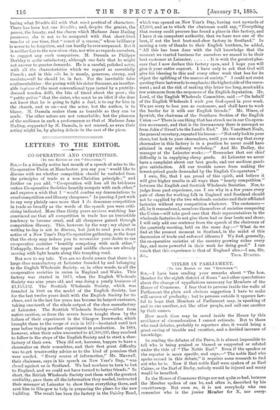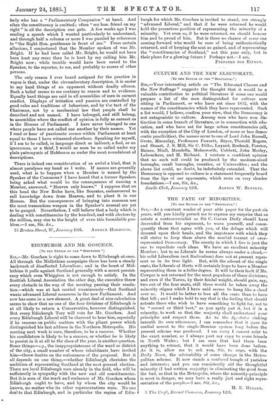TITLES 1N PARLIAMENT.
[To THE EDITOR OF THE " SPECTATOR•"1 SIR,—I have been reading your remarks about "The hon. Member for the eighth district of Essex" and other speculations about the change of appellations necessary for Members of the House of Commons. I fear that to persons inside the walls of Parliament the plain and obvious suggestion I have to make will savour of profanity ; but to persons outside it appears lawful to hope that Members of Parliament may, in speaking of and to one another, act like other people, and call one another by their names.
How much time may be saved inside the House by this avoidance of circumlocution I cannot estimate. But to those who read debates, probably to reporters also, it would .bring a great saving of trouble and vexation, and a decided increase of knowledge.
In reading the debates of the Peers, it is almost impossible to tell who is being praised or blamed or supported or refuted under the title of "The Noble Earl." Even if the speaker or the reporter is more specific, and says,—" The noble Earl who spoke second in this debate," it requires some research to find out who he is. Now if that noble Earl were spoken of as Earl Cairns, or the Earl of Derby, nobody would be injured and many would be benefited.
In the House of Commons things are not quite so bad, because the Member spoken of can be, and often is, described by his constituency. But even so, it is not everybody who can remember who is the junior Member for X, nor every
body who has a "Parliamentary Companion" at hand. And often the constituency is omitted; often "my hon. friend on my right" is all the description one gets. A few weeks ago I was reading a speech which I wanted particularly to understand, and through half a column or more I was puzzled by references to "the Right Hon. gentleman in front of me." From certain allusions, I conjectured that the Member spoken of was Mr. Bright. If he had been called Mr. Bright, he would not have been hurt any more than he is hurt by my calling him Mr. Bright now; while trouble would have been saved to the Speaker, to the reporter, to me, and probably to scores of other persons.
The only reason I ever heard assigned for the practice in vogue is that, under the circumlocutory description, it is easier to say hard things of an opponent without deadly offence. Such a belief seems to me contrary to reason and to evidence. Equally hard things are said in all assemblies of men in earnest conflict. Displays of irritation and passion are controlled by good rules and traditions of behaviour, and by the tact of the Chairman, not by a mechanical law that people shall be described and not named. I have belonged, and still belong, to assemblies where the conflict of opinion is fully as earnest as in the Houses of Parliament. I have never belonged to one where people have not called one another by their names. Yet I read or hear of passionate scenes within Parliament at least equal to those I have witnessed elsewhere. Speaking for myself, if I am to be called, in language direct or indirect, a fool, or an ignoramus, or a thief, I would as soon be so called under my plain patronymic of Hobhouse as under the most roundabout of descriptions.
There is indeed one consideration of so awful a kind, that it almost paralyses my hand as I write. If names are generally -used, what is to happen when a Member is named by the Speaker of the Commons ? I have heard that a former Speaker, being asked what would be the consequences of naming a Member, answered, "Heaven only knows." I suppose that on this head the New Rules have, like Socrates, endeavoured to call knowledge down from Heaven, and to plant it in our Houses. But the consequences of bringing into common use the most tremendous weapon in the Speaker's arsenal are yet to be gauged. Nevertheless, I will believe that a body which is dealing with constituencies by the hundred, and with electors by the million, may rise to the height of even this formidable problem.—I am, Sir, &c.,
15 BMW?. Street, W., January 19th. ARTUUR HODUOUSE.







































 Previous page
Previous page